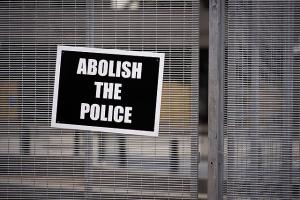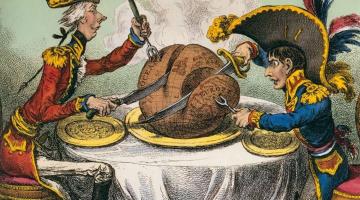People decorated poster board with photos and messages in marker at a vigil for a mother and child killed following a police shooting. (KCTV5/Betsy Webster)
The settler colony known as the United States inflicts violence upon Black people as a function of its existence. But the murder of a mother and her infant daughter by Missouri police officers is illustrative of how the violence usually directed at Black people inevitably impacts others as well.
Police responding to a domestic dispute in the Kansas City, Missouri suburb of Independence stormed the garden apartment complex on the afternoon of November 7 with pistols drawn--and at least one officer clambering up the stairs with an assault rifle--burst into the home that Mitchell Holder shared with his girlfriend Maria Pike and opened fire, killing their infant daughter, Destiny Hope.
She was two months old.
And then the police trained their guns on Pike and fatally shot her.
In a press conference the following day, Independence Police Chief Adam Dustman told reporters that the shooting was justified.
“When we arrived, officers encountered a female who ultimately was armed with a knife,” Dustman said. “And as a result of that encounter, it resulted in two fatalities, one to the armed female and one to a child.”
But the baby’s father, Holder, told an African American online news outlet, The Kansas City Defender, that the mother of his child was unarmed.
“Yes, I was in the room when it all happened. From what I could see, I never once saw Maria armed with anything. I honestly don’t even know where that came from. I’ve heard crazy things like that she was holding the baby hostage in a closet, that she had a knife, all this crazy stuff that’s not true. I mean, all I can say is it’s possible she had a knife and somehow I didn’t see it, but all I know is I never saw her holding anything—and I was right there in the room.”
The fatal shootings of a mother and child were set in motion when Destiny’s grandmother, Talisa Coombs, called 911 to report that Maria had assaulted her during an argument. Upon arrival, Coombs told The Defender, the police officers “…asked me what happened? I said I was assaulted by my son’s girlfriend. And they asked if there was any weapons upstairs in the apartment. I said, ‘no’ but there’s a baby up there, my granddaughter."
“I wanted her arrested for assault, not executed,” she told The Defender.
Neighbors describe the officers’ response as militarized as if they were engaging an active school shooter rather than an unarmed mother who weighed barely 100 pounds and had a history of mental illness. Holder said that the officers seemed intent on escalation.
“Before they came in, I asked if we could talk through the door. I didn’t want my baby Destiny to be around the cops with their weapons out like that,” he said, his voice breaking. “But ultimately, they came in.”
An officer opened fire almost immediately, Holder said, striking his daughter as Pike cradled her in her arms. He told The Defender:
‘They shot my baby,’ Holder said, his voice shaking with grief and fury. ‘It looked like her head exploded. Her blood splattered across my glasses and all over me. All I could do was scream. I just kept saying three words—the same three words—‘YOU KILLED HER!’ I was screaming it. Over and over.’
He paused, collecting himself before continuing. “I know she died instantly. There was a huge hole in her head.”
The horror didn’t end there. Holder described how Maria, Destiny’s mother, reacted in the moments after her baby was shot.
‘Immediately Maria jumped up. And as soon as she did, I don’t know if the cop got scared or something, but then he fired another shot that hit Maria. I think it hit her in the hip. And the cop didn’t stop her bleeding the right way, he didn’t know what he was doing. I believe she choked on her blood and bled out. That’s my understanding of how she died.’
What is nearly as shocking as the level of violence deployed by a small-town Midwestern police force to settle a seemingly banal family quarrel is that the victims were not Black, but white. While studies consistently indicate that African Americans are far more likely to be killed by police than are other demographics, that does not mean that whites are immune from police violence. Indeed, police nationwide killed the highest number of people on record in 2023—1164—nearly half of whom were white, according to a Washington Post database. Similarly, police have killed 1017 people so far this year, according to the Post.
Dating back to at least the French psychiatrist Frantz Fanon, post-colonial scholars have noted the tendency of state violence targeting subjugated, racialized populations both at home and abroad to leak, or spill over into communities populated by European settlers.
“I just think the fact that they are poor white people speaks to the boomerang effect,” The Defender’s founder and Executive Editor Ryan Sorrell told Black Agenda Report in a phone interview, “and how the violence we export to places like Palestine comes home.”
This is especially true of settler colonial states in its final, desperate stages—think apartheid South Africa and Algeria under French occupation—as authorities find it increasingly difficult to police a social order that is coming apart at the seams.
That is an apt description for the U.S. in a postindustrial era that began to bottom out 16 years ago after the Obama administration bailed out the investors who were responsible for the collapse of an overvalued real estate market, leaving borrowers– disproportionately African American-- holding the bag.
Bordering Kansas City, Independence was the adopted home of President Harry S. Truman and the site of his presidential library. With a population of 123,000, Independence is overwhelmingly white—nearly 75 percent—and increasingly poor; 15 percent of the population lives at or below the poverty threshold, according to the U.S. Census, slightly higher than the statewide average of 12 percent.
As decent-paying manufacturing jobs have dried up, so have opportunities in Independence, which was known as the “meth capital of the world” a generation ago, according to Sorrell, who quit his job at a Chicago PR agency to return to his hometown and start the independent media platform. The Defender’s website reads:
We were birthed from the ashes of the 2020 uprisings. As Black people, as young people, as organizers and abolitionists, it became glaringly apparent during 2020 that we could not depend on white media nationally or locally to serve our best interests, or to empathize and advocate for us.
Ironically, it was The Defender that broke the gruesome story of the police killing of Pike and her daughter. Following the Independence police chief’s news conference which failed to identify the victims or any details of the shooting, Sorrell managed to track down Destiny’s grandmother, Coombs, who made the 911 call that ended in the fatal shooting.
Sorrell also went to the apartment complex where he exclusively interviewed Holder, and a neighbor named “Bug” Arnold who watched from a “bedroom window as police stormed the scene, rifles drawn, exuding a readiness to shoot before even entering the building.”
“They led with their guns the entire time,” Bug said. “From the moment they jumped out of their cars, it was as if they were ready to kill.” Bug told Sorrell that the police initially burst through his door.
‘I don’t know exactly what they had, but it was just like the real big guns they were holding, like this. And the first cop was like holding his gun to the side, which I, I don’t think that’s necessary. But they the entire time, led with the gun, from the time they got out of the car to the time that they came in.
Here, they opened my door so aggressively that my like, wreath from the front door came into the living room, and it was like a big piece of it was broken off. And I don’t know how that happened, but it took about, like three, three times for me, of me, explaining the situation for them to, like, actually leave, and just the entire time they had their guns on me, I, I wasn’t sure what to do. I was just frantically, like, waving my arms, like, Oh my God! No! No! You have the wrong house! You have the wrong house! And then they accused me of, like, doing something to their officer, like, ‘where’s my officer! What’d you do with my officer!” I said ‘I don’t know where your officer is, sir. I assume he’s in the other apartment, because you have the wrong apartment.’
And after that, he seemed to, like, finally kind of get it in his head, and then he said, “we got the wrong apartment!” and then they just stormed out. And I was nobody.
The Defender’s grassroots reporting distinguishes the outlet from the mainstream media that continues to defer to the police version of events and emphasize local social service agencies’ handling of Pike’s mental health challenges.
Sorrell acknowledges that he was initially reluctant to invest The Defender’s scarce editorial resources into covering the police shooting. “We are an abolitionist news outlet and exclusively devoted to covering Black people,” Sorrell said in an interview. “I had to ask myself at first if I even want to cover this story… but ultimately decided that if we are going to be in solidarity with any white people, it is the ones who are impacted similarly by police violence.”
The Defender’s reporting harkens back to independent journalists such as Ida B. Wells who have historically amplified the voices of the poorest and most oppressed, helping to foment transformative social movements. In 1931, the Communist organ, the Southern Worker, broke the story that the two white women who falsely accused nine, Black teenage hoboes of sexual assault on an Alabama train were, in fact, sex workers, and interviewed the parents of the accused youths, humanizing the defendants known as the Scottsboro boys–so named for the Alabama town where they were arrested— and leading ultimately to the labor organizing and social movements that shaped the New Deal, and civil rights movement.
Similarly, the nation’s largest African American newspaper, the Pittsburgh Courier, inspired what was arguably the most successful public relations effort in the nation’s history, the Double V campaign, rallying Americans to defeat fascism both at home and abroad by publishing a firsthand account of racial discrimination in the munitions industry just as the U.S. was entering World War II.
The Defender raised its profile two years ago when it wrote a series of articles that concluded that a serial killer was preying on African American sex workers who had disappeared. Police had dismissed the allegations for years before arresting a man accused of murdering two African American women and torturing a third.
“I started The Defender because I kept feeling constrained by these racist imperialist narratives that define our communities from the colonizer’s perspective,” Sorrell said.
What the legacy media fails to understand, he said, is that the violence and dispossession that plagues Black communities across the country will eventually seep into white communities, like poison gas. As the killing of a white woman and her baby suggests, African Americans are the canaries in the coal mine that is white settler society.
Jon Jeter is a former foreign correspondent for the Washington Post, Jon Jeter is the author of Flat Broke in the Free Market: How Globalization Fleeced Working People and the co-author of A Day Late and a Dollar Short: Dark Days and Bright Nights in Obama's Postracial America. His work can be found on Patreon as well as Black Republic Media.

















